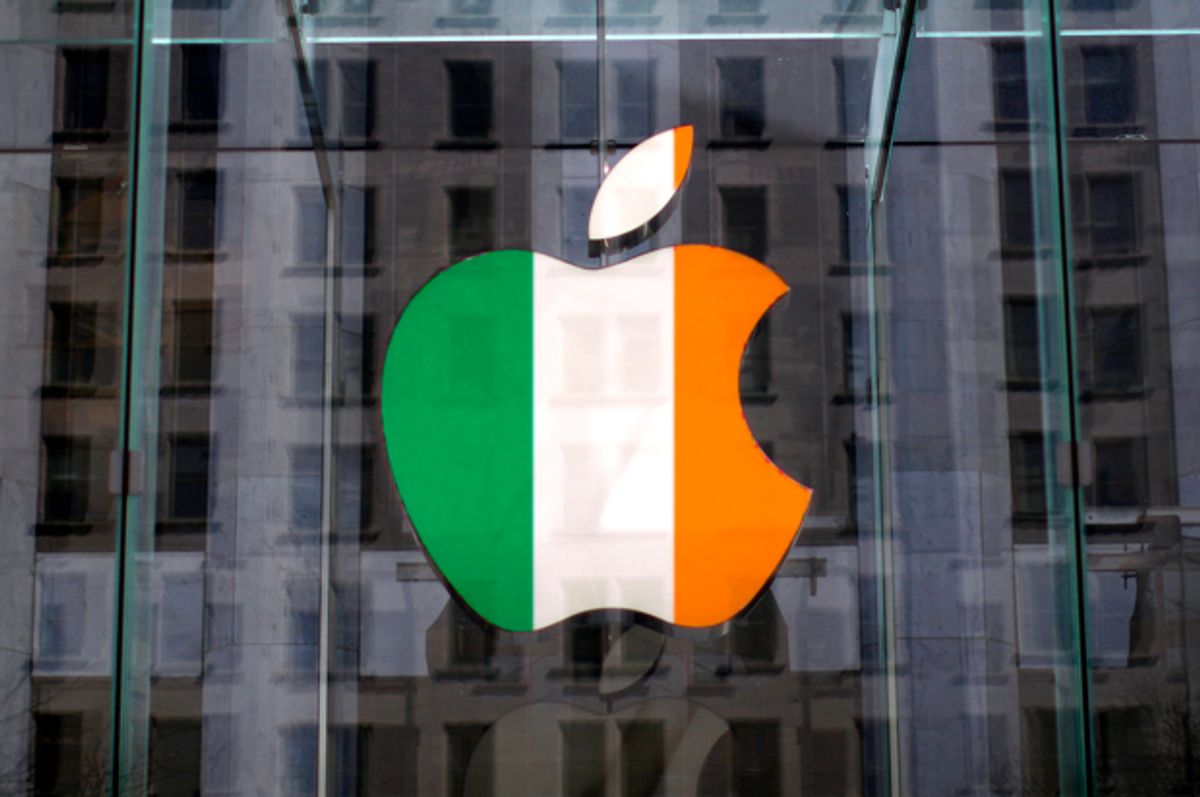It’s hard to come up with a better example of just how topsy-turvy the global corporate tax situation is than Ireland’s effort to prevent Apple Inc. from paying it more than $14 billion in back taxes. The country, which only a few years ago was digging itself out of insolvency, doesn’t want the money. Instead the Irish government is fighting to protect its right to offer sweetheart tax arrangements to multinational companies in return for jobs.
This deal between Apple and Ireland, which the European Commission claims lowered the tech giant’s EU tax bill to 0.005 percent in 2014, is just one of many complex agreements that the world’s largest companies have made with countries to reduce their local tax burdens and, in the case of big American multinationals, shield massive amounts of cash from being taxed by the United States, which has one of world's highest corporate tax rates.
Now that the EU has thrown down the gauntlet to member states like Ireland, The Netherlands and Luxembourg, demanding that they close the tax loopholes eagerly exploited by companies including Apple, Starbucks, McDonald’s and Amazon.com, the question is what’s going to happen next. Some argue that efforts to curb tax-avoidance practices in one place will simply encourage companies to shop around for another tax jurisdiction.
“I don’t think Apple is going to abandon Ireland, but what the European Commission is doing will make companies think twice about using an E.U. country instead of a non-E.U. country,” Ryan Dudley, an international tax consultant and a partner at Friedman LLP, told Salon. “It may be that we’ll soon see more investment in Switzerland or Singapore as opposed to Ireland or Luxembourg.”
Indeed, trying to collect corporate tax revenue in a global economy can seem like a game of Whac-A-Mole, where the moment one loophole is closed, another one opens up elsewhere. Singapore, for example, has a 17 percent corporate tax rate, but it charges nothing for sales generated abroad, a deal the U.S. wouldn’t offer.
The prevalence of tax-avoidance schemes among American corporations is hard to overstate. Fortune 500 companies have amassed more than $2 trillion overseas, denying the U.S. Internal Revenue Service a staggering $695 billion in taxes. Apple alone has avoided paying $66 billion in U.S. taxes by diverting its global revenue away from the United States, according to Citizens for Tax Justice, a progressive tax policy group based in Washington, D.C.
“From a worldwide public policy perspective, dropping tax rates to attract profit-shifting corporations is a race to the bottom, with the governments of the world in the aggregate realizing fewer tax dollars,” Jeffery M. Kadet, a tax lecturer at the University of Washington School of Law, told Salon.
So why, if the U.S. government has so much to gain in revenue, is it so hesitant to join the European Union in playing tax hardball?
Last week U.S. lawmakers from both parties condemned Brussels’ ruling against Ireland for its tax arrangement for Apple. And both Congress and the White House are mulling ways to collect taxes on money brought stateside from overseas while still lowering the overall tax burden companies would pay under alternative proposals.
“Europe has signaled that it’s tackling this problem, but the Obama administration and Congress have failed to engage effectively in this debate,” Clark Gascoigne, deputy director of the Financial Accountability and Corporate Transparency Coalition, told Salon.
Currently, the U.S. tax code provides so-called deferrals. This means corporations pay taxes on global sales only if that money comes to the U.S., allowing them to indefinitely defer taxes on international revenue. Apple alone has $215 billion in deferred cash.
But some, including Kadet, are proposing a big shift in the way the U.S. corporate tax code operates, one that would require coordinated efforts by Congress and the White House. Called a “full-inclusion” system, it would subject all U.S. corporate revenue to American taxes regardless of where the money is earned or stashed. A company would be able to deduct taxes paid in foreign countries from its U.S. bill (to avoid double taxation), but this system would eliminate all deferrals.
The Obama administration is proposing a onetime tax charge of 14 percent on corporations’ overseas holding of cash and a permanent 19 percent tax on foreign earnings. Congressional lawmakers are pursuing a similarly structured proposal — but with a much lower tax rate.
But critics argue that both plans would do little to discourage companies from hoarding cash overseas and these proposals both represent a backdoor way of cutting corporate taxes. If you’ve wondered if there is an issue where the Obama administration and the Republican Congress can find common ground, the answer is: yes, corporate handouts.
“The Obama administration is saying it wants to bring the money back," said Gascoigne. "But if we look at the actual plan, it enshrines loopholes in the tax code. It’s a huge giveaway.”
As Europe forges ahead aggressively moving to close corporate tax loopholes, the U.S. has been presented with an opportunity to address the costly practice of companies' deferring their tax burdens by parking their cash overseas. But it seems that the only solution that the White House and Congress are willing to consider is baiting companies with even more tax breaks. In an effort to fill the country's tax coffers, we're trying to underbid Ireland.
“Tax competition among countries is bad, and the present system sadly encourages it,” said Kadet. “And I’m not particularly optimistic there will be a solution to this in my lifetime.”



Shares